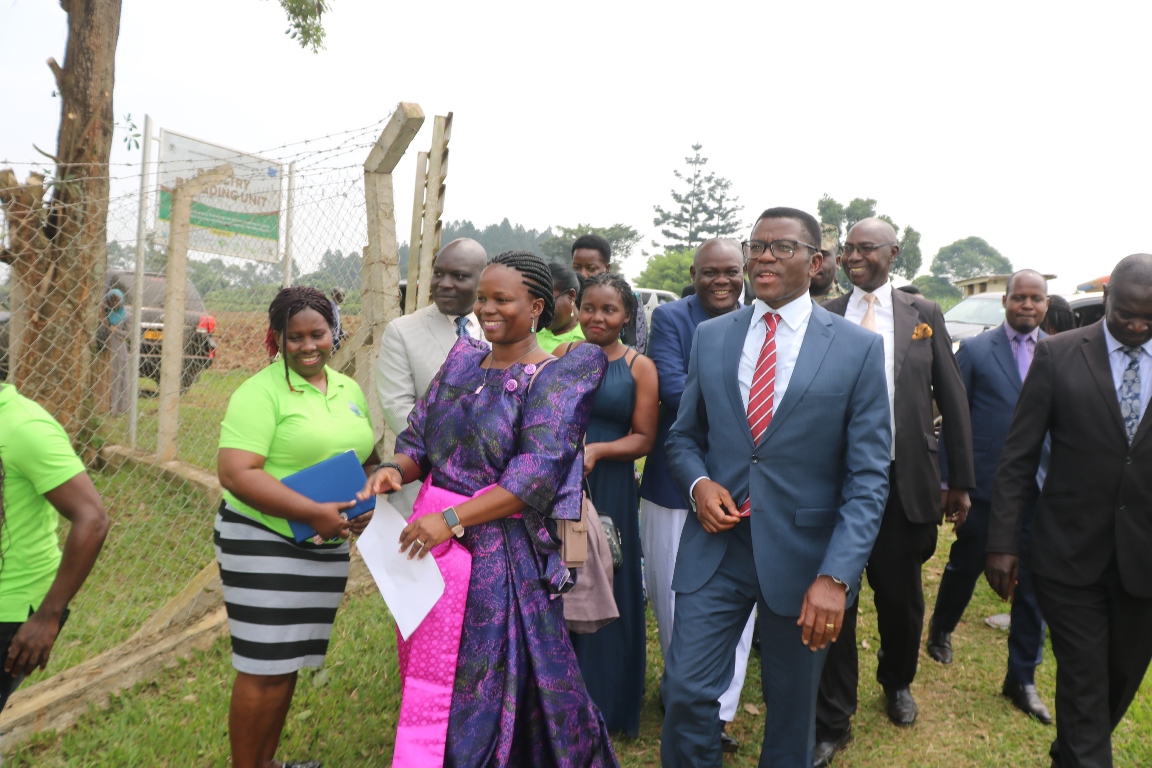
The Katikkiro of Buganda, Charles Peter Mayiga has urged government to increase the budget allocated for the agriculture sector.
Mayiga said that as a sector in which Uganda has a comparative advantage, if handled and funded well, it can lead to more yields compared to other sectors, industrialisation inclusive.

“With the progress registered from the sector in the field of research by the National Agriculture Research Organisation (NARO), if the government picks more interest and enable the results from NARO’s research to be extended to farmers in different districts, enabling them to produce more agriculture yields, Uganda can be in position to feed its population, the neighbouring countries and also export to Arab and European countries,” he said.
Mayiga made the remarks at his tour of the National Coffee Research Institute Uganda (NACORI) located at Kituuza in Ntenjeru-Kisoga Town Council and Mukono Zonal Agricultural Research and Development Institute (MUZARDI) found at Ntaawo cell in Mukono Central division, Mukono municipality.
He said that currently, most of the African countries are looking for ways of transforming their countries economically, adding, that can be possible if priority is given to the sectors in which we have a comparative advantage.
Comparative advantage is an economy’s ability to produce a particular good or service at a lower opportunity cost than its trading partners.

“I believe in Uganda we have the comparative advantage in agriculture, we can grow enough food to feed our citizenry and have the surplus which we can export for foreign currency. Though we can also manufacture vehicles, I don’t think the factors around enable us to do well in that field than agriculture,” he said.
However, the Katikkiro said that just like South Korea did, Uganda can also become an industrial country but putting emphasis on agriculture, the sector which is more favourable by its location, the weather and many other factors.
“Be it growing food or cash crops, cattle keeping, poultry or fishing, Uganda has comparative advantage in all those. Imagine a farmer in Israel who would wish to do fish farming yet the country’s water is full of salt, meaning he or she must first incur money to work on the water, which is not the case with Uganda where almost everything is possible at free or less cost,” he said.
From NACORI, Katikkiro Mayiga went to MUZARDI in Mukono municipality and started his tour with the section which is improving the local chicken developing it into fast growing breed.

Dr. Barbara Zawedde, the director of MUZARDI said that this local chicken breading and production unit aimed at improving the local chicken into better breeds with faster growth and increased egg production rate.
One of the researchers taking a lead in this project, Dr. Henry Mulindwa said that they collected a variety of local chicken from all-over the country including Northern Uganda, which is one the leading regions in local chicken rearing and they are currently making the improvement of those local breeds into a better local breed.

Mulindwa said that unlike the local breeds which have been taking more than a year to grow and start laying eggs, the one which they are coming up with is so much better.
“In a period of four-five months, they are weighing at least two and a half kilograms and between five-six months, they start laying the eggs,” he made the assurance.
He however said that they are maintaining the local genes because what they are coming up with is not a hybrid. Therefore, he added that the end product from this research will test the same as the local chicken, not like the hybrid.
The Katikkiro headed to the urban farming unit where the emphasis is put on growing vegetables in limited space.
The agriculturist heading this facility, Robina Gafabusa told the Katikkiro that they are mainly intending to meet the demands of the urban dwellers who do not have space for agriculture yet they need the products like fruits and vegetables.
“We grow vegetables in plythene bags, sacks, used motor vehicle tires and many others. With this kind of farming, even people in rentals can grow vegetables, instead of growing flowers,” Gafabusa said.
The Katikkiro said among the things that amused him from this section, was a tomato plant which had very many fruits which can take a family for some weeks.

He also toured the fish breeding section which is mainly multiplying better breeds of fish which they supply to fish farmers who keep them in ponds.
Mayiga implored MUZARDI officials to make sure that they invite as many youths as they can to learn from the new technologies they discover so that they can go back and put into practice what they learn.
Dr. Zawedde assured him that they went into a memorandum of understanding with Buganda Kingdom to start sensitizing the youth and women on modern farming practices.
“The good thing with us, we teach as people see practically what we instruct them to do. Very many of the people who attend our sensitization workshops have started practicing what we teach them and their livelihoods are changing gradually,” she said.
The Katikkiro moved with a company of Buganda Ministers, who included; Amis Kakomo, the Minister of State for Agriculture, trade and Cooperatives, Israel Kazibwe, of information and Dr. Ben Ssekamatte, of Buganda Culturaal and Development Foundation (BUCADEF) which is a kingdom’s body responsible for promoting farming, trade, cooperatives and other agendas.
